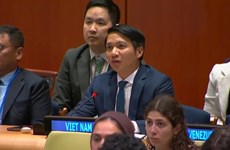Phu Tho works hard to spread Hung Kings worship rite
The northern midland province of Phu Tho is working hard to preserve and
spread the values of the worship rite of the country’s legendary
founders Hung Kings. The rite was recognised as an Intangible Cultural
Heritage of Humanity by the UNESCO in 2012.
The northern midland province of Phu Tho is working hard to preserve and
spread the values of the worship rite of the country’s legendary
founders Hung Kings. The rite was recognised as an Intangible Cultural
Heritage of Humanity by the UNESCO in 2012.
Legend has it that Lac Long Quan, son of King Duong Vuong married to Au Co, daughter of King De Lai. Au Co then gave birth to a sac containing 100 eggs from which 100 children were born. The couple then decided to separate in order to populate the land and propagate the race, so half the children followed their mother to the highlands and the remaining half went with their father to the sea.
The first child went with mother Au Co to Phong Chau, now Phu Tho province. He then became King Hung and founded the first nation in the history of Vietnam, called Van Lang.
Ruling the country through 18 dynasties, Hung Kings taught people how to grow wet rice. They chose Nghia Linh mountain, the highest in the region, to exercise rituals devoted to rice and sun deities to pray for lush crops.
To honour Hung Kings’ great services, a complex of temples dedicated to the Kings was built on Nghia Linh mountain, and the tenth day of the third lunar month is designated as the annual national commemorative anniversary.
The worshiping of Hung Kings, which is closely related to the worship of ancestors that is a tradition of most Vietnamese families and forms an important part of the people's spiritual lives, is practised nationwide, at 1,417 temples and places of worship across the country.
Home to the largest and oldest temple dedicated to Hung Kings, Phu Tho also has 325 other places in commemoration of the Kings and the figures living in the Hung Kings reign.
In addition to upgrading local worship places, the province has invested heavily in facilities around Hung Kings temple such as cultural and tourism villages and festival organising sites.
As part of efforts to comply with the 2003 Convention for the Safeguarding of the Intangible Cultural Heritage, it has added courses on heritage and Hung Kings worship rituals into school curricula.
Spiritual tours of relics related to the Hung Kings period will be on offer while managerial staff working at cultural heritage sites will receive training and incentives as well.-VNA
Legend has it that Lac Long Quan, son of King Duong Vuong married to Au Co, daughter of King De Lai. Au Co then gave birth to a sac containing 100 eggs from which 100 children were born. The couple then decided to separate in order to populate the land and propagate the race, so half the children followed their mother to the highlands and the remaining half went with their father to the sea.
The first child went with mother Au Co to Phong Chau, now Phu Tho province. He then became King Hung and founded the first nation in the history of Vietnam, called Van Lang.
Ruling the country through 18 dynasties, Hung Kings taught people how to grow wet rice. They chose Nghia Linh mountain, the highest in the region, to exercise rituals devoted to rice and sun deities to pray for lush crops.
To honour Hung Kings’ great services, a complex of temples dedicated to the Kings was built on Nghia Linh mountain, and the tenth day of the third lunar month is designated as the annual national commemorative anniversary.
The worshiping of Hung Kings, which is closely related to the worship of ancestors that is a tradition of most Vietnamese families and forms an important part of the people's spiritual lives, is practised nationwide, at 1,417 temples and places of worship across the country.
Home to the largest and oldest temple dedicated to Hung Kings, Phu Tho also has 325 other places in commemoration of the Kings and the figures living in the Hung Kings reign.
In addition to upgrading local worship places, the province has invested heavily in facilities around Hung Kings temple such as cultural and tourism villages and festival organising sites.
As part of efforts to comply with the 2003 Convention for the Safeguarding of the Intangible Cultural Heritage, it has added courses on heritage and Hung Kings worship rituals into school curricula.
Spiritual tours of relics related to the Hung Kings period will be on offer while managerial staff working at cultural heritage sites will receive training and incentives as well.-VNA













